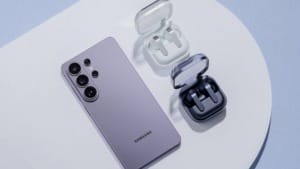Samsung develops wearable technologies for the early detection of heart and brain conditions
Samsung is developing wearable devices that detect early signs of heart failure and monitor brain activity using new EEG technology.

Samsung is developing advanced wearable technologies designed to identify early signs of heart and brain health issues. The company’s research aims to help users monitor their well-being more effectively and enable early intervention before serious conditions develop.
Table Of Content
Early detection of heart failure
In a recent announcement shared through Samsung Newsroom, the South Korean technology giant revealed it has created a wearable system capable of detecting Left Ventricular Systolic Dysfunction (LVSD), a common form of heart failure.
LVSD occurs when the heart’s left ventricle fails to pump blood efficiently, often as a result of coronary artery disease or high blood pressure. According to Samsung, LVSD accounts for roughly 50 per cent of all heart failure cases. The company highlighted that early detection could play a critical role in improving survival rates, noting that patients diagnosed with heart failure face only a 50 per cent chance of surviving five years after diagnosis.
To develop this technology, Samsung collaborated with Medical AI to create an algorithm based on the 12-lead electrocardiogram (ECG) — a diagnostic method widely used in Korean hospitals. The algorithm can screen individuals who show no visible symptoms of LVSD, enabling early intervention through lifestyle or medical adjustments. Samsung stated that this preventive approach could help reduce the strain on healthcare systems by minimising the need for late-stage treatments.
Brain monitoring with ear-based EEG technology
In a separate research initiative, Samsung partnered with Hanyang University’s Department of Biomedical Engineering to explore brainwave monitoring through a wearable electroencephalogram (EEG) device designed to fit around the ear.
An EEG measures electrical activity in the brain, helping medical professionals diagnose a range of conditions, including epilepsy, strokes, tumours, brain injuries, and certain sleep disorders. While traditional EEGs require multiple electrodes attached to the scalp, Samsung’s prototype is a more compact and convenient alternative.
According to Samsung, this ear-EEG prototype successfully detected the onset of drowsiness in real-time and demonstrated an impressive 92.68% accuracy in identifying users’ “video preferences” based on brainwave data. The company said the findings from this study were published in the IEEE Sensors Journal, Volume 23, Issue 18. However, it did not specify what types of videos were shown to participants during testing.
The results suggest a potential future where wearables could help assess cognitive states or personal preferences through brainwave analysis, opening up new possibilities in both healthcare and personalised technology.
Future applications and availability
Both technologies remain in the research and development stage, with no confirmed plans for integration into Samsung’s current or upcoming wearable devices. The company stated that it will continue to focus on developing innovations aimed at improving health outcomes and expanding the role of wearable technology in preventive care.
While Samsung has not provided a specific timeline for when these technologies might reach consumers, the company’s continued investment in health-focused wearables suggests a growing commitment to merging medical research with everyday technology.
















